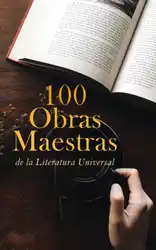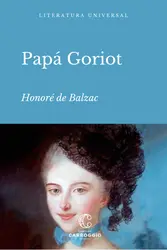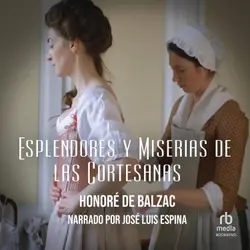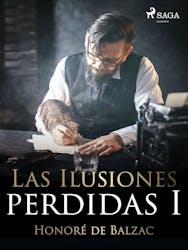In "Rise and Fall of Cesar Birotteau," Honoré de Balzac masterfully chronicles the rise and eventual downfall of a middle-class perfumer in early 19th century Paris. This detailed narrative offers a profound exploration of ambition, social status, and the mercurial nature of fortune within the framework of Balzac's renowned "La Comédie Humaine." Rich in its portrayal of Parisian society, the novel employs a keenly observational literary style, blending satire and realism while underscoring the relentless pursuit of success and the susceptibility to corruption inherent in human ambition. Balzac's intricate character development and vivid depictions of city life serve as a revealing commentary on the social structures and economic imperatives of his time. Honoré de Balzac (1799-1850), a pivotal figure in the literary canon, drew upon his experiences of financial struggle and societal observation, which informed the themes of capitalism and moral decay depicted in this work. His commitment to chronicling the intricacies of social classes and their interrelations highlights his belief in the importance of individual narratives within the greater societal fabric. As a writer deeply embedded in the era's tumult, Balzac effectively illustrates the pitfall of aspirations gone awry through the lens of his characters. This novel is an essential read for those interested in the complexities of human nature and the sociocultural dynamics of the 19th century. Balzac's intricate storytelling invites readers to reflect on the moral dilemmas faced by individuals in the throes of ambition. Highly recommended for students of literature and history alike, this work epitomizes the richness of human experience and the often-unforgiving landscape of societal expectation.

100 Obras Maestras de la Literatura Universal
Johann Wolfgang Goethe, Gustave Flaubert, Franz Kafka, Lewis Carroll, Sigmund Freud, Henrik Ibsen, Charles Dickens, Honoré de Balzac, Mark Twain, Immanuel Kant, Friedrich Schiller, Harriet Beecher Stowe, Oscar Wilde, Robert Louis Stevenson, Edgar Allan Poe, William Shakespeare, Dante Alighieri, Giovanni Boccaccio, Bram Stoker, Charlotte Brontë, Emily Brontë, Jack London, Henry James, Louisa May Alcott, Victor Hugo, Arthur Conan Doyle, Joseph Conrad, Jane Austen, José Rizal, Edgar Rice Burroughs, Herman Melville, Jonathan Swift, Gustavo Adolfo Bécquer, Vicente Blasco Ibáñez, Benito Pérez Galdós, Jean-Jacques Rousseau, Daniel Defoe, Pedro Calderón de la Barca, Virginia Woolf, Washington Irving, Juan Valera, Horacio Quiroga, Nathaniel Hawthorne, Charles Baudelaire, Wilkie Collins, William Makepeace Thackeray, Voltaire, Apuleius, Leopoldo Alas, John Milton, José Martí, Lope de Vega, Emilio Salgari, Francisco de Quevedo, Rubén Darío, Antonio Machado, José Zorrilla, Tirso de Molina, Emilia Pardo Bazán, Fernando de Rojas, L. Frank Baum, H. G. Wells, J. M. Barrie, H. Rider Haggard, H. P. Lovecraft, Seneca, Hans Christian Andersen, Friedrich Nietzsche, Mary Shelley, Baltasar Gracián, Sófocles, Sun Tzu, Fiódor Dostoyevski, Antón Chéjov, León Tolstoi, Tomás Moro, San Agustín, Nikolái Gógol, Julio Verne, Homero, Platón, Alejandro Dumas, Aristóteles, Hermanos Grimm, Jorge Isaacs, Ignacio de Loyola, Nicolás Maquiavelo, Miguel Cervantes, Teresa de Jesús, Alejandro Dumas hijo, Mijaíl Bakunin, Miguel De Unamuno, Duque de Rivas, Ramón María del Valle-Inclán, Federico García Lorca, Gibrán Jalil Gibrán
book
100 Obras Maestras de la Literatura Universal
Homero, Sófocles, Platón, Aristóteles, Apuleius, Seneca, San Agustín, Sun Tzu, Teresa de Jesús, Ignacio de Loyola, Nicolás Maquiavelo, Dante Alighieri, Giovanni Boccaccio, Miguel Cervantes, Hans Christian Andersen, Hermanos Grimm, William Shakespeare, John Milton, Tomás Moro, Jean-Jacques Rousseau, Immanuel Kant, Jonathan Swift, Daniel Defoe, Charles Dickens, William Makepeace Thackeray, Jane Austen, Charlotte Brontë, Emily Brontë, Robert Louis Stevenson, Oscar Wilde, Mary Shelley, Bram Stoker, Henry James, Arthur Conan Doyle, Wilkie Collins, Joseph Conrad, H. Rider Haggard, Edgar Rice Burroughs, H. G. Wells, Edgar Allan Poe, H. P. Lovecraft, Washington Irving, Harriet Beecher Stowe, Mark Twain, Herman Melville, Jack London, Nathaniel Hawthorne, Louisa May Alcott, J. M. Barrie, Lewis Carroll, L. Frank Baum, Voltaire, Victor Hugo, Honoré de Balzac, Gustave Flaubert, Alejandro Dumas, Alejandro Dumas hijo, Julio Verne, Emilio Salgari, Johann Wolfgang von Goethe, Friedrich Schiller, Friedrich Nietzsche, Franz Kafka, Nikolái Gógol, Fiódor Dostoyevski, León Tolstoi, Antón Chéjov, Mijaíl Bakunin, Virginia Woolf, Fernando de Rojas, Lope de Vega, Tirso de Molina, Francisco de Quevedo, Pedro Calderón de la Barca, Baltasar Gracián, José Zorrilla, Vicente Blasco Ibáñez, Juan Valera, Leopoldo Alas, Benito Pérez Galdós, Miguel De Unamuno, Emilia Pardo Bazán, Duque de Rivas, José Martí, Antonio Machado, Ramón María del Valle-Inclán, Jorge Isaacs, Horacio Quiroga, Federico García Lorca, Gustavo Adolfo Bécquer, Rubén Darío, Charles Baudelaire, Henrik Ibsen, Gibrán Jalil Gibrán, José Rizal
book
Papá Goriot : La comedia humana
Honoré de Balzac
book
La prima Bela : (Original French); Cousin Bette
Honoré de Balzac
audiobook
Las ilusiones perdidas : (Original French: Illusions perdues)
Honoré de Balzac
audiobook
Esplendores y miserias de las cortesanas : (Original French: Splendeurs et miseries des courtesanes)
Honoré de Balzac
audiobook
La prima Bela
Honoré de Balzac
book
El primo Pons
Honoré de Balzac
book
La muchacha de los ojos de oro
Honoré de Balzac
book
La Casa Nucingen
Honoré de Balzac
book
Ilusiones perdidas
Honoré de Balzac
book
Las Ilusiones perdidas I
Honoré de Balzac
book
